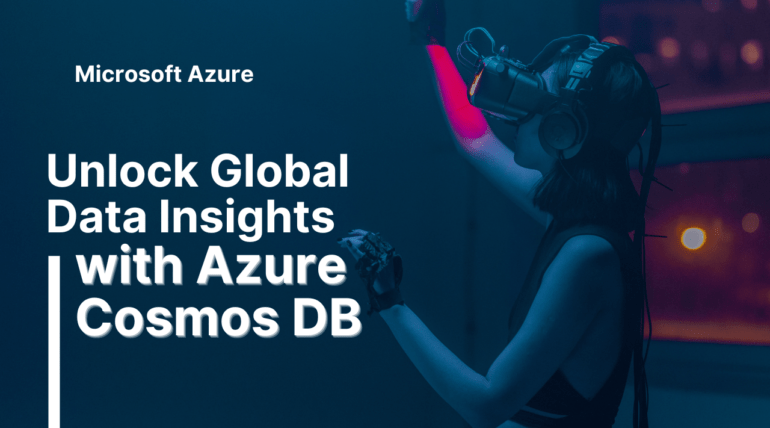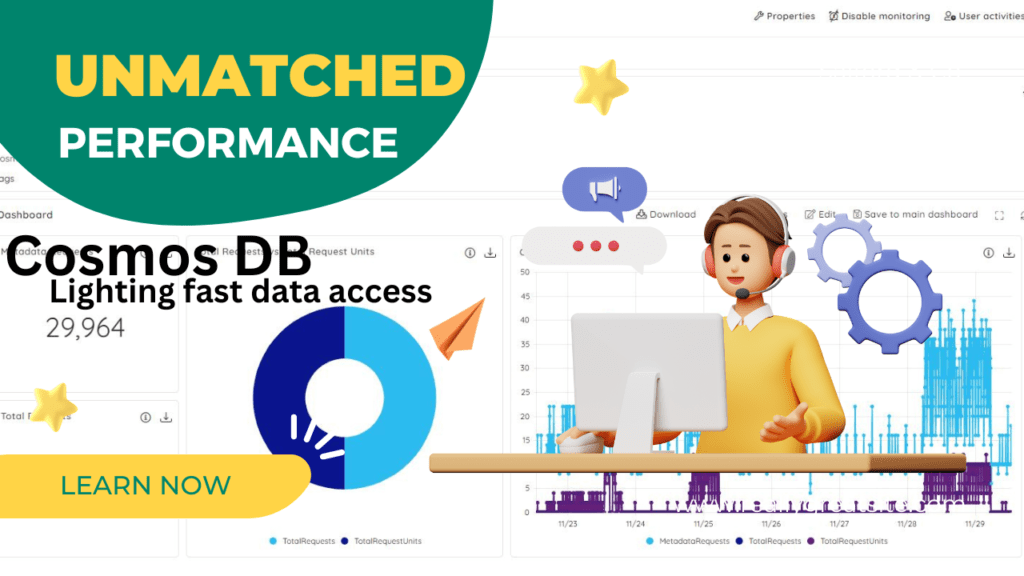
Microsoft Azure provides a multi-model database service called Cosmos DB, which is distributed globally. It’s designed for modern applications that require high availability, scalability, and low-latency access to data. Here are some key things to know about Cosmos DB:
- Multi-model.
- Globally distributed.
- Highly scalable.
- Low latency.
- Easy to use.

Cosmos DB acts as a versatile toolbox for storing, managing, and querying all sorts of non-relational data. Here’s a breakdown of its capabilities:
- NoSQL Database: At its core, Cosmos DB is a NoSQL database, meaning it thrives on data that doesn’t require the rigid structure of tables and rows found in relational databases. This makes it perfect for storing non-relational data like:
- JSON documents.
- Semi-structured data.
- Unstructured data.
- Flexible Schema: Unlike relational databases, where you define the schema upfront, Cosmos DB offers flexible schema.
- API Variety: Cosmos DB provides multiple APIs for interacting with your data, allowing you to choose the one that best suits your data model:
- SQL AP.
- MongoDB API.
- Other APIs.
History and evolution of Cosmos DB
Started as “Project Florence” within Microsoft to address the challenges of large-scale applications in 2010. Then in 2015, launched the first version for Azure developers as Azure Document DB, focusing on documents and Rebranded to Azure Cosmos DB, expanding to a multi-model database supporting various data structures in 2017.
The importance of Cosmos DB in modern business

In today’s data-driven world, modern businesses are increasingly working with non-relational data. This can include things like social media posts, sensor data, and customer reviews. Traditional relational databases, with their rigid structures, can struggle to handle this kind of data efficiently.
This is where Cosmos DB comes in. As a NoSQL database, Cosmos DB offers several key advantages for managing non-relational data in modern businesses:
- Scalability: Cosmos DB is highly scalable. Businesses can easily add or remove storage and processing power as their data needs grow, without worrying about downtime or performance bottlenecks.
- Flexibility: Unlike relational databases that require a predefined schema, Cosmos DB is schema-agnostic. This means it can store data in a variety of formats, including JSON, documents, and key-value pairs. This flexibility is crucial for businesses working with constantly evolving data structures.
- Performance: Cosmos DB is designed for high performance. It offers low latency reads and writes, making it ideal for applications that require real-time data access.
- Global Distribution: Cosmos DB can replicate data across multiple geographical locations. This ensures high availability and low latency for users around the world.
- Cost-Effectiveness: Because Cosmos DB is a pay-as-you-go service, businesses only pay for the resources they use. This can be a significant advantage for businesses with fluctuating data storage needs.
Here are some specific examples of how modern businesses can leverage Cosmos DB for non-relational data:
- IoT data storage: Businesses can use Cosmos DB to store and analyse data from sensors and other IoT devices.
- Real-time analytics: Cosmos DB can be used to power real-time dashboards and applications that provide insights into customer behaviour and operational efficiency.
- Mobile app development: Cosmos DB can be used as the backend for mobile applications that require high performance and scalability.
- Social media analytics: Businesses can use Cosmos DB to store and analyse social media data to gain insights into customer sentiment and brand perception.
Job opportunities at Cosmos DB
- Cosmos DB Developer.
- Azure Cloud Architect.
- NoSQL database developer.
- Big Data Engineer.
- Backend Developer (with a focus on non-relational databases).
The average salary for someone with Cosmos DB skills can range from$1,400 to $2,904. In the US, a Principal Software Engineer role at Microsoft working on Cosmos DB can have a base salary range of USD $133,600 to $256,800, going up to $173,200 to $282,200 in certain locations.
The Future of Cosmos DB

Overall, Cosmos DB is well-positioned to be a leader in non-relational data management. Its ability to handle various data models, scale seamlessly, and integrate with other Azure services makes it a compelling choice for modern application development.






